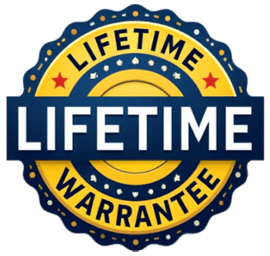

The Truth About Refrigerator Water Filters: Why They Don’t Actually Purify Your Water
Many homeowners believe that the water flowing from their refrigerator dispenser is clean, pure, and free of contaminants. After all, it passes through that filter you diligently replace every six months, right? Unfortunately, this common assumption couldn’t be further from reality. The uncomfortable truth is that refrigerator filters are primarily designed to improve taste and odor—not to comprehensively purify your drinking water. This misconception leaves millions of Americans unknowingly consuming water that contains potentially harmful substances, even after it passes through their refrigerator’s filtration system.
Municipal water supplies across America face increasing challenges from aging infrastructure, industrial pollution, and agricultural runoff. Even water that meets minimum regulatory standards often contains concerning levels of contaminants that refrigerator filters simply cannot address. From lead and PFAS to pharmaceutical residues and disinfection byproducts, these substances remain present in your glass of water despite passing through your refrigerator’s basic carbon filter.
Understanding what your refrigerator filter actually does—and more importantly, what it doesn’t do—is crucial for making informed decisions about your family’s drinking water. This knowledge gap represents one of the most significant misunderstandings in household water quality today. As water contamination issues continue to make headlines across the country, from Flint, Michigan to Jackson, Mississippi, consumers need accurate information about the limitations of their existing filtration systems.
The reality is that refrigerator filters provide only minimal protection against a narrow range of contaminants. They’re designed primarily to reduce chlorine taste and odor while capturing some larger particles—leaving many harmful substances untouched. For families seeking genuinely clean water, understanding these limitations is the first step toward implementing more effective solutions.
How Refrigerator Filters Actually Work
Refrigerator water filters utilize a surprisingly simple mechanism to process your drinking water. Most models employ a basic activated carbon filtration system—essentially a porous carbon material that water passes through before reaching your glass. This carbon material works through a process called adsorption, where certain contaminants adhere to the surface of the carbon as water flows past. While this process can be effective for specific substances, it represents an extremely limited approach to comprehensive water purification.
The typical refrigerator filter contains a single-stage carbon block that primarily targets chlorine, which municipalities add as a disinfectant. This explains why filtered refrigerator water often tastes and smells better than tap water—the chlorine flavor has been reduced. However, this basic filtration mechanism falls dramatically short when confronting the complex mixture of contaminants present in most municipal water supplies. The carbon block simply lacks the capability to address dissolved minerals, heavy metals, pharmaceutical residues, and many industrial chemicals.
Manufacturing constraints further limit refrigerator filter effectiveness. These filters must balance water flow rate with filtration capability—if they removed more contaminants, your water would dispense too slowly for practical use. This compromise means that refrigerator manufacturers prioritize convenience over comprehensive purification. Additionally, the compact size of refrigerator filters severely restricts the amount of filtration media they can contain, further limiting their effectiveness compared to dedicated water purification systems.
The certification standards for refrigerator filters also reveal their limitations. While many carry NSF/ANSI certifications, these often only verify the filter’s ability to improve taste and odor or reduce a handful of specific contaminants—not comprehensive purification. Consumers frequently misinterpret these limited certifications as evidence that their refrigerator filter provides complete protection, when in reality, they address only a small fraction of potential water quality concerns.
Common Contaminants Your Refrigerator Filter Misses
Municipal water supplies across America contain numerous contaminants that standard refrigerator filters cannot effectively remove. Perhaps most concerning are PFAS (per- and polyfluoroalkyl substances), often called “forever chemicals” because they persist indefinitely in the environment and human body. These industrial compounds have been linked to cancer, hormone disruption, and immune system damage. Despite their serious health implications, the basic carbon filters in refrigerators lack the specialized media necessary to capture these persistent chemicals.
Heavy metals represent another category of contaminants that refrigerator filters struggle to address comprehensively. While some premium refrigerator filters may reduce lead to some degree, they typically cannot handle the full spectrum of metallic contaminants that may be present in your water. Arsenic, chromium, mercury, and other metals require specialized filtration technologies beyond what refrigerator systems provide. These metals enter water supplies through natural geological processes, industrial activities, and aging infrastructure, creating a complex contamination profile that basic carbon filtration cannot adequately address.
Pharmaceutical residues and personal care product chemicals increasingly contaminate municipal water supplies as treatment plants lack the capability to remove these compounds. From antibiotics and hormones to pain relievers and mood stabilizers, these substances enter the water cycle through human excretion and improper disposal. The activated carbon in refrigerator filters may capture some of these compounds, but their limited contact time and filtration capacity mean that many pass through unaffected. This growing category of contaminants represents an emerging concern that refrigerator filtration technology simply wasn’t designed to address.
Agricultural contaminants, including pesticides, herbicides, and fertilizer components like nitrates, pose additional challenges that refrigerator filters cannot adequately meet. While carbon filtration can reduce some pesticides, the limited media volume in refrigerator filters means they quickly become saturated and ineffective. Nitrates, which have been linked to blue baby syndrome and other health concerns, require specialized ion exchange media entirely absent from refrigerator filtration systems. For households in agricultural regions, these limitations can leave significant contamination unaddressed despite the presence of a refrigerator filter.
The Reality of Municipal Water Treatment
Municipal water treatment facilities across America operate under significant constraints that limit their ability to deliver truly pure water to your home. These systems were primarily designed decades ago to address basic sanitation concerns—removing pathogens and visible particulates—not the complex mixture of industrial chemicals, pharmaceutical residues, and other modern contaminants now present in water sources. This fundamental mismatch between treatment capabilities and contemporary contamination challenges means that even properly functioning municipal systems allow numerous substances to reach your tap.
The regulatory framework governing municipal water also contains concerning gaps. The Safe Drinking Water Act regulates fewer than 100 contaminants, while researchers have identified thousands of chemicals potentially present in water supplies. This regulatory lag means that many substances remain completely unmonitored and uncontrolled in public water systems. Even for regulated contaminants, the established limits often represent political compromises rather than health-based standards, allowing legally “compliant” water to contain levels of certain substances that health researchers consider problematic.
Infrastructure challenges further compromise municipal water quality. America’s aging water infrastructure—with some systems utilizing pipes and facilities over a century old—introduces additional contamination through leaching, breaks, and cross-contamination. The American Society of Civil Engineers consistently gives America’s water infrastructure near-failing grades, highlighting the systemic challenges facing municipal suppliers. These infrastructure issues mean that even properly treated water can become recontaminated during distribution, introducing lead, copper, bacteria, and other contaminants before reaching your home.
Disinfection practices themselves create additional water quality concerns. While chlorine and chloramine effectively kill pathogens, they react with organic matter in water to form disinfection byproducts (DBPs) like trihalomethanes and haloacetic acids. These compounds have been linked to cancer and reproductive issues, yet they’re created by the very process intended to make water safe. Refrigerator filters can reduce some chlorine taste but typically lack the specialized media needed to address the full spectrum of DBPs, leaving these treatment-created contaminants in your drinking water.
Advanced Filtration Solutions: Beyond the Refrigerator
Reverse osmosis systems represent the gold standard in residential water purification, offering capabilities far beyond what refrigerator filters can provide. These sophisticated systems force water through a semi-permeable membrane with pores so tiny that they block contaminants at the molecular level while allowing water molecules to pass through. This fundamental difference in filtration mechanism enables reverse osmosis to remove up to 99% of dissolved solids, heavy metals, industrial chemicals, and even many pharmaceutical residues—contaminants that refrigerator filters simply cannot address.
Modern reverse osmosis systems typically incorporate multiple filtration stages to provide comprehensive protection. A typical configuration includes sediment pre-filtration to remove particles, carbon pre-filtration to reduce chlorine and organic chemicals, the reverse osmosis membrane itself, and often a final carbon “polishing” filter to improve taste. This multi-barrier approach addresses a much broader spectrum of contaminants than the single-stage filtration found in refrigerators. For households concerned about water quality, this comprehensive approach provides peace of mind that refrigerator filtration simply cannot match.
Whole-house filtration systems offer another advanced solution that addresses water quality throughout your entire home. Unlike refrigerator filters that only treat water at a single dispensing point, whole-house systems purify water before it reaches any faucet, shower, or appliance. This comprehensive approach protects your family not just from drinking water contaminants but also from chemicals that can be absorbed through the skin during bathing or released as vapor during hot showers. For households in areas with significant water quality challenges, this whole-home protection provides benefits that point-of-use refrigerator filters cannot approach.
For those seeking specialized contaminant removal, dedicated filtration systems targeting specific concerns offer capabilities far beyond refrigerator filters. Whether addressing high levels of arsenic, removing radiological contaminants, or tackling specific industrial pollutants, these specialized systems employ filtration media and technologies precisely matched to particular water quality challenges. This targeted approach ensures effective removal of priority contaminants without compromise—a level of performance that the one-size-fits-all approach of refrigerator filtration cannot achieve.
Making Informed Decisions About Your Water
Understanding your specific water quality challenges represents the essential first step toward effective filtration. Municipal water quality reports, while helpful, often provide only limited information about regulated contaminants and may not reflect the actual water quality reaching your home. Professional water testing provides a more comprehensive assessment, identifying both regulated and unregulated contaminants present in your specific water supply. This detailed knowledge allows you to select filtration solutions precisely matched to your actual water quality challenges rather than relying on the generic approach of refrigerator filtration.
When evaluating filtration options, certification standards provide crucial guidance beyond manufacturer claims. Look for systems certified to NSF/ANSI standards specific to the contaminants concerning you—Standard 53 for health-related contaminants, Standard 58 for reverse osmosis systems, or Standard 401 for emerging contaminants. These independent certifications verify performance claims through rigorous testing protocols. Most refrigerator filters carry only limited certifications for taste and odor improvement (Standard 42) rather than comprehensive contaminant reduction, highlighting their limited protective capabilities.
Cost considerations should encompass both initial investment and long-term operational expenses. While refrigerator filters appear economical at first glance, their limited capabilities mean they’re often a poor value proposition for genuine water quality improvement. More comprehensive systems like reverse osmosis may require greater initial investment but typically deliver much lower cost-per-gallon of truly purified water over their operational lifetime. This long-term perspective reveals that advanced filtration often represents not just better protection but also better economic value than the perpetual replacement of limited-capability refrigerator filters.
Maintenance requirements significantly impact both filtration effectiveness and user experience. Refrigerator filters require replacement every six months under ideal conditions, but their limited capacity means they may become ineffective much sooner in homes with challenging water quality. More comprehensive systems typically offer greater filtration capacity and longer service intervals, reducing the maintenance burden while providing superior protection. For busy households, these practical considerations can be just as important as technical performance specifications when selecting appropriate water quality solutions.
